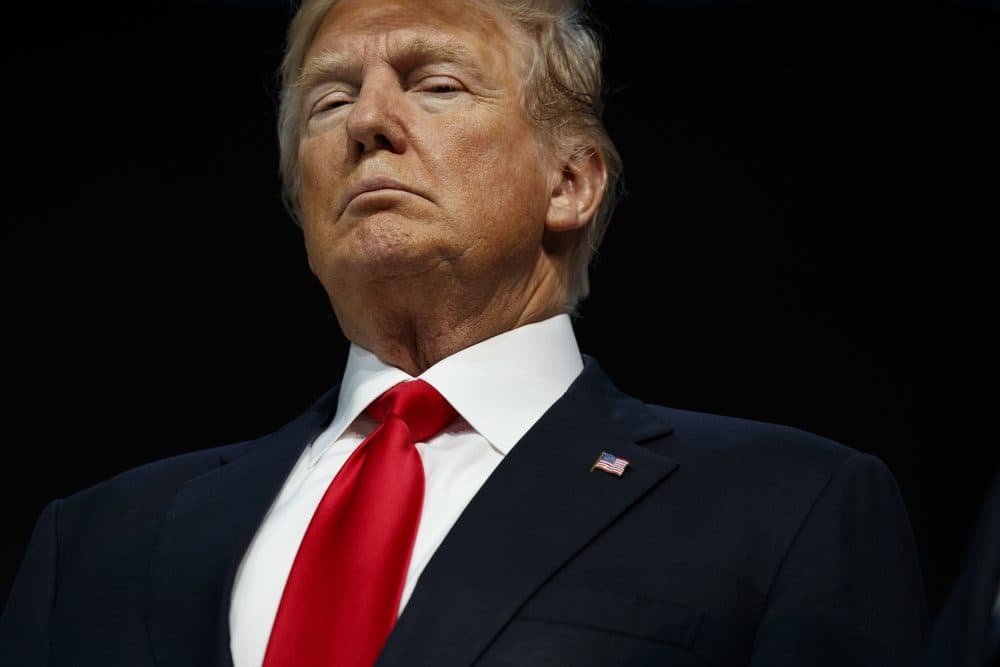Advertisement
Commentary
The State Of The Economy Is Strong — But It's Not Because Of Trump

Donald Trump’s lustiest cheerleader being Donald Trump, the president may blow a vocal cord delivering Tuesday’s State of the Union speech, in which he’s sure to extol the economy in similar tones to those he used at the Davos economic forum last week. Record stock values, brimming business confidence, low unemployment: We owe all to our beloved leader’s deregulation, tax cut, and America First resolve, he boasted.
His supporters, who sound increasingly batty defending him on other matters (not a racist? Please.), seem on firmer ground when they echo their man’s self-praise as Master of The Economic Universe. As we anti-Trumpers pride ourselves on being fair and balanced when they aren’t (condemning Hillary Clinton’s wrist slap for a sexual pig on her staff is a case in point), let’s admit that the president deserves credit on the economy.
Very, very little credit.
In the president’s defense, there’s the fact that executives and economists say the ethos of deregulation Trump fostered over the last year has inspired business to invest more.
Mind you, I expect Trump’s regulatory rollback to prove misguided. He threatened to scuttle President Obama’s climate change plan, eliminated regulations on mining runoff in streams and a ban on plastic bottles in national parks, and has questioned banking rules passed after the financial crash itself the result of unregulated “shadow banking.” I’d argue more pollution and future financial crises aren’t worth an immediate business high. But it appears that said high is paying dividends for now.
Meanwhile, those of us with 401(k)s sleep better because of galloping stock values, which the president’s Twitter trigger finger relentlessly touts. Some analysts indeed attribute the high-flying stock market to gleeful anticipation of Trump’s corporate tax cut.
But the president’s bullishness has more than bit of bull, if you read that previous link. Like the rest of Trump’s agenda, Wall Street’s success mostly bypasses the least among us. Almost half of Americans don’t own stocks, including almost three-quarters of those families whose household incomes fall in the bottom half of the range.
And while pension funds invest in the market and profit from its rise, sadly, fewer than one in five workers has a pension plan. Retirement saving has shifted largely over the decades from companies to workers, and even then, less than a quarter of Americans have an IRA
Given growing inequality — underlined by a recent U.N. report on extreme American poverty — and as Trump’s one legislative success his corporate tax cut, overwhelmingly favors the affluent, the president’s inaction on behalf of the needy is indefensible.
Trumpers have an answer: Ah, but the tax bill’s one-time rate reduction on repatriated cash from abroad will spur Apple to bring home hundreds of billions of dollars for job creation here. True, even if economists are dubious about how many jobs that will create.
If the repatriation benefits are questionable, the claim that lower corporate rates have unleashed a spree of pay hikes for American workers is flat-out risible. Walmart’s raises, for example, are just the latest in a string the retailer initiated in 2015 and 2016. (You remember those years, during the supposedly socialist Obama reign?) Analysts suggest Walmart’s newest pay hikes likely owe to a desire to shed its image as a Scrooge-ish employer and to cut costly workforce turnover.
Other companies also have incentives to raise pay to attract and keep workers when low unemployment means few can be found at cheap wages. Anyway, even free-market-advocating Reason magazine doesn’t buy the raises-from-tax-cutting spin, noting, “It takes time for companies to invest new capital, and reap the benefits of their investment.” Trump signed the tax cut three days before Christmas; it’s not even Valentine’s Day yet.
It can’t be said enough: The belief in tax cuts as a can’t-fail elixir to economic growth has been disproven to all but fanatics.
If Trumponomics has had any consistency, it has been its embrace of protectionism, reflected in the president’s new tariffs on imported washing machines and solar panels. The promised jobs cornucopia therefrom ignores inconvenient real-world truths. First, Imported washing machines have barely dented American employment in that industry.
Every major economy in the world is going gangbusters, too; apparently, only a leader in a persistent vegetative state couldn’t ride this tide.
Second, the solar panel tariff is temporary, making it doubtful that the largely non-existent industry in the U.S. will be reborn. What manufacturer would lavish money on factories with only temporary protection? But the tariffs will raise, at least temporarily, the cost to consumers of clean-energy solar panels, which have become ever cheaper until now.
A final stake in the notion that this administration has worked an American miracle: Every major economy in the world is going gangbusters, too; apparently, only a leader in a persistent vegetative state couldn’t ride this tide.
And “leader of the free world” doesn’t mean our president runs global prosperity. “If Trump’s pro-business policies were driving the global economy,” former treasury secretary Lawrence Summers writes, “one would expect an increase in net capital flows into the United States, and so a strong dollar. In fact, the dollar has weakened significantly in the past year …”
Trump’s fabled ego is big enough to fill the globe, but claiming he’s master of the global economy would be as much hype as his supposed miracle-working with our economy — the little credit he deserves notwithstanding.
